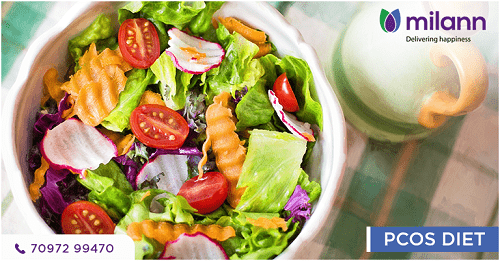
What is PCOS?.
Polycystic Ovary Syndrome (PCOS) is a very common endocrine condition affecting 5 to 10% of women in the age group 12–45 years. It leads to the formation of cysts in ovaries causing various symptoms which differ individually. The most common symptoms are irregular periods, excess facial or body hair, acne, scalp hair loss, weight gain, and other metabolic symptoms. It is also characterized by lack of ovulation, but ovulatory PCOS are also known to occur. How does PCOS affect fertility? PCOS causes hormonal imbalance in women by increasing the production of androgens which are essentially male hormones. They affect the release and development of the eggs leading to infertility. Since, PCOS is also considered a metabolic syndrome, other subtle changes in the endocrine milieu are also considered to be involved in the occurrence of infertility. PCOS Diet Management of PCOS begins at home by imparting lifestyle changes. With a few alterations in the diet, women can reduce the risk of PCOS. The internet is flooded with many articles on the PCOS diet with conflicting information, which is why it is important to know how your body works and make necessary dietary changes that can help you. Always remember the purpose of your dieting to keep yourself motivated. Testosterone, a hormone that works in unison with insulin levels is the main culprit which causes a majority of the symptoms of PCOS. Higher insulin level leads to the accumulation of excess fat and makes it almost impossible to lose weight. However, the insulin level can be controlled by watching what we eat. Hence, it should be the prime focus behind an effective PCOS diet. Types of food recommended for PCOS Low glycemic index Glycemic spikes the insulin levels. Women with PCOS who wish to become pregnant should consume food items that are low in glycemic index. Eat whole grain cereals, pulses, and vegetables, soy milk, oatmeal, legumes, multigrain bread, low-fat yogurt. Prefer fruits over juices. Avoid processed products, white rice, flour, corn flakes, potatoes, and similar food with a high glycemic index. Anti-inflammatory Spinach, green tea, beans, lentils, dark chocolate, coconut, and turmeric are anti-inflammatory. These foods help in controlling insulin levels. High-fibre Consuming high-fiber food keeps you full for a longer duration and helps you avoid unwanted calorie intake. High fiber food can also reduce inflammation, eliminate toxins and help in weight loss. A diet rich in fiber should include fruits, vegetables, sprouts, flax seeds, and brown rice. Rich in Omega 3 Food rich in omega 3 helps in reducing inflammation. Include items like fish, eggs, walnuts, etc. in your diet and replace the regular oil with olive oil for cooking. While these foods are highly recommended for women with PCOS to get pregnant, a particular diet may not work for every woman. Make a personalized diet plan based on your calorie requirements. Also, note that depriving oneself of food is not a solution as it can lead to undernourishment. Eating in regular intervals is a good way to control the portion and meet daily calorie requirements. Avoid binge eating and drinking. Along with a structured diet plan, it is also important to exercise regularly and have a healthy lifestyle. If you’re unsure about your diet structure, it is always recommended to see a diet consultant. Being aware and careful is all that you need to control PCOS. Visit us at the nearest Milann Fertility Clinic for an expert advice and personalized care.We use cookies and IP addresses to improve site performance and understand user interests. This data does not personally identify you unless you voluntarily provide information. Third-party advertisers may also use cookies.
OKPrivacy Policy